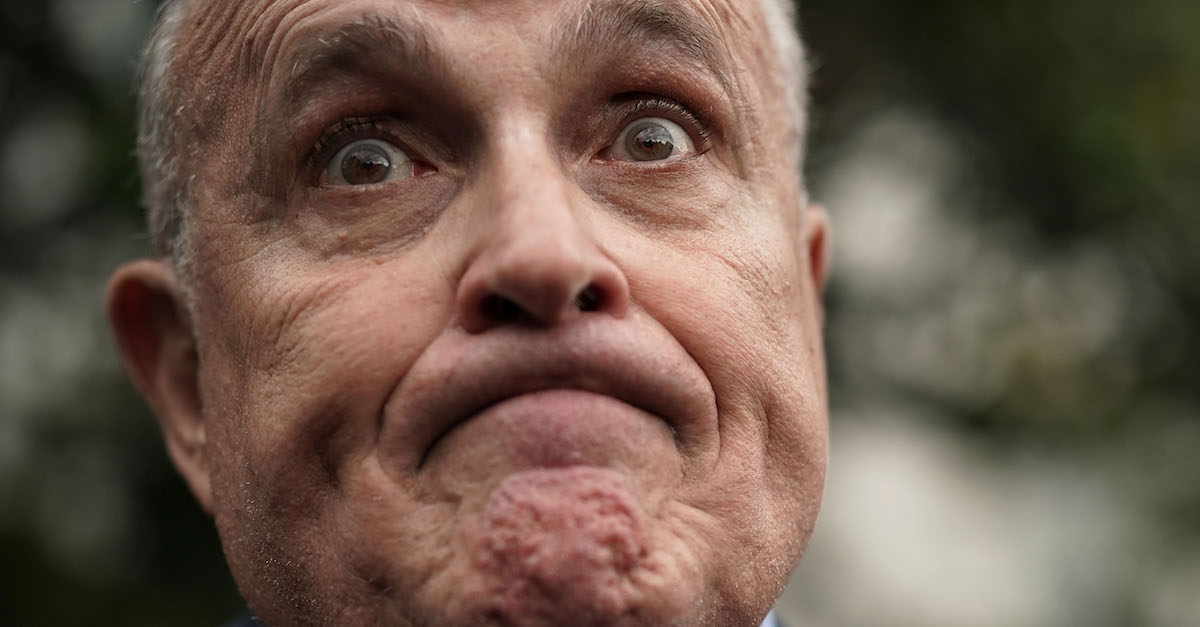
Rudy Giuliani is trying desperately to dig himself out of a credibility canyon, and it’s really not working. Last night, a grinning Chris Cuomo revealed a rather damning document for CNN’s viewers to see. The document, dated October 13, 2015, was a “letter of intent,” signed by both Donald Trump and Andrew Rozov, of I.C. Expert Investment Company, located in Moscow.
CNN: @ChrisCuomo: “The facts fly in the face of… the story the president would have you believe. This is the letter of intent for the proposed Trump Tower Moscow… It is signed by Donald J. Trump. How do I know? Well… I’ll show it to you.” https://t.co/lUUhH6uK0x
— Evan Rosenfeld (@Evan_Rosenfeld) December 19, 2018
On its first page, the letter says that it “is only intended to facilitate further discussions between the Parties and solely represents the Parties’ current intention to negotiate for and attempt to enter into a mutually acceptable agreement covering all aspects of the transaction, subject, however, to the terms and conditions hereafter provided.” It goes on to discuss a licensing project for Trump World Tower Moscow.
Trump’s plans for real estate development in Moscow have been kind of a thing lately, since Michael Cohen admitted last month that he lied to Congress about discussions revolving around the project.
Last Sunday, Giuliani spoke with CNN about this letter of intent, when he told Dana Bash that such a letter existed, “but no one signed it.”
Giuliani told @DanaBashCNN two days ago that for Trump Tower Moscow, “there was a letter of intent to go forward, but no one signed it.” False. Don Jr. already told Congress his dad signed the deal. And today, @ChrisCuomo obtained the signed letter itself. https://t.co/YY2dcBMIgH pic.twitter.com/hScKgXAQ86
— Marshall Cohen (@MarshallCohen) December 19, 2018
Rudy boarded the Backtrack Express Tuesday night after Cuomo’s big reveal, later telling the Daily News that he’d never denied the letter’s having signatories. “I don’t think I said nobody signed it,” Giuliani said. And in a rare flash of lucidity regarding the nature of contracting, Giuliani admitted that “of course” Trump signed the letter, “How could you send it but nobody signed it?” Giuliani asked.
Giuliani told the New York Daily News that the letter was nothing more than “bulls—t,” because it “didn’t go anywhere,” explaining that a letter of intent is simply “an expression of interest that means very little unless it goes to a contract and it never did.”
Let’s talk about letters of intent for a minute, shall we?
Letters of intent are a favorite exam topic of contracts law professors. That’s because their importance isn’t always clear. Often, letters of intent serve no purpose other than to declare one party’s interest in doing business with another. Without that interest developing into an enforceable contract with obligations on both sides, it has no serious legal weight. In other circumstances, however, letters of intent are interpreted by courts to create “agreements to agree,” or other limited-scope deals. Accordingly, the letters can create certain enforceable obligations on a party.
In an American Bar Association article entitled, “A LETTER OF INTENT IS ENFORCEABLE. A LETTER OF INTENT IS NOT ENFORCEABLE.” attorney Ira Meislik explains, “While most courts understand the non-binding concept of an LOI and its role in a commercial transaction, there are exceptions where a court will treat the terms of the LOI as the “real deal.” In short, the legal status of letters of intent can be a lot more complicated than America’s Mayor is interested in admitting.
Where does that leave us with the Trump-Moscow letter of intent? Well, it all depends on context. Giuliani would probably be right if we were examining whether Andrew Rozov or I.C. Expert Investment Company could sue Trump to force him to move forward with Trump World Tower Moscow. Likely, the letter couldn’t stand in for an entire contract on a such a complex project, and its existence (signed or not) would be meaningless for anyone trying to force a deal to proceed.
However, focusing on Russians’ ability to win a contract lawsuit against Trump couldn’t be farther from the point. Michael Cohen was asked about Trump’s plans to develop business in Moscow. Trump was asked about business plans in Russia. Giuliani was asked about the existence of a letter of intent. Declaring the letter meaningless in those contexts is like arguing that a marriage proposal is irrelevant in ascertaining whether two people might have been dating.
Regardless of whether the letter of intent is an actual contract for real estate licensing, its existence is proof positive that in October 2015, Donald Trump intended to pursue a real estate deal in Moscow. The fact that it was sent by Donald Trump himself, and signed by both Trump and Rozov is proof that Giuliani’s public declarations are, well, bullshit.
[Image via Alex Wong/Getty Images]
This is an opinion piece. The views expressed in this article are those of just the author.